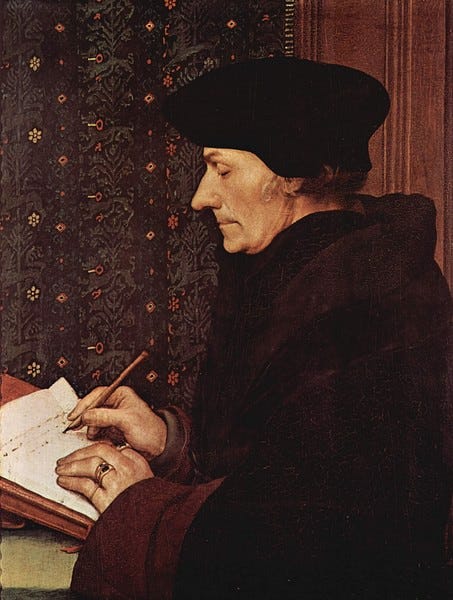The Prayers of That Great Cloud of Witnesses
Desiderius Erasmus: A Compendium Entry
Read first the best books. The important thing for you is not how much you know, but the quality of what you know. -Desiderius Erasmus.
It was one of my first staff meetings as an Associate Pastor in South Carolina. The Senior Pastor asked our long-time church secretary to open our meeting in prayer. She hesitated, looked quite uncomfortable, and finally said, “I don’t pray out loud.” He recovered quickly, asking another staff person to pray.
The church secretary is not alone, and I think I know why. I noticed the problem when I was asked to pray in Spanish. I was fluent in everyday Spanish, but praying in Spanish was like learning yet another language. “Oracion” used different vocabulary from common conversation, replete with theological language. Voiced prayers seek to accurately express what we believe in words and phrases shared by other followers of Jesus. Though challenging, we need to deepen our learning of biblical language about God.
Today’s prayer from “That Great Cloud of Witnesses” helps us to ask God for help in this endeavor. Desiderius Erasmus was learned about the things of God. He was one of the most influential writers of his time. He prepared new Latin and Greek scholarly editions of the New Testament with annotations and commentary that continue to be very influential in both the Protestant Reformation and the Catholic Reformation. In his day, he was the most popular, most printed, and arguably most influential author of the early sixteenth century, read in all Western nations and frequently translated. By the 1530s, his writings accounted for 10–20% of book sales in Europe.
In this prayer, he reveals the source of his profound understanding of God. Using Jesus’ words, “I am the way and the truth and the life. No one comes to the Father except through me,” (John 14:6), he asks for divine guidance in learning and understanding, in seeking wisdom and knowledge so that he might better grasp God and His teachings.
O Lord Jesus Christ,
the Way, the Truth, and the Life:
Do not let us stray from you, the Way,
nor distrust you, the Truth,
nor rest in anything other than you, the Life. Amen.
In this concise prayer, as in many of his writings, Erasmus invokes Jesus Christ as the “Way, the Truth, and the Life.” Such prayers were on his lips as he developed new and fresh ways to translate the scriptures and to apply the Bible to the questions and issues of his day. In sharing it with us, he urges us to ask God to keep us on the right path as we respond to the duties and challenges of our own time.
Short Biography
Erasmus’s almost 70 years may be divided into four chapters:
First was his medieval Dutch childhood, ending with his being orphaned and impoverished.
Second, his struggling years as a canon (a kind of semi-monk), a clerk, a priest, a failing and sickly university student, a would-be poet, and a tutor.
Third, his flourishing literary productivity following his 1499 contact with a reformist English circle, notably John Colet and Thomas More, then with radical French Franciscan Jean Vitrier, and later with the Greek-speaking Aldine New Academy in Venice; engaging with leading intellectuals and reform-minded churchmen of the West.
Fourth, his financially more secure Reformation years first in Basel and then as a Catholic religious refugee in Freiburg: as a prime influencer of European thought through his New Testament projects and increasing public opposition to aspects of Lutheranism, in direct correspondence with kings and popes.
He remained a member of the Catholic Church all his life, remaining committed to reforming the church from within. His influential “middle of the road” approach disappointed and even angered partisans in both camps.
Lessons for our prayers
Write out Erasmus’ prayer in your prayer book while considering how Jesus is the way, the truth, and the life for you. Note the practical ways you have experienced these characteristics of Jesus.
Write out a prayer you could voice publicly that expresses these personal truths about Jesus as the way, the truth, and the life.
Reflect on this character and how it can help you in your discipleship.
For Further Reading:
In Praise of Folly, which offers a witty critique of society and the Church.
Biography: Johan Huizinga, Erasmus and the Age of Reformation.


